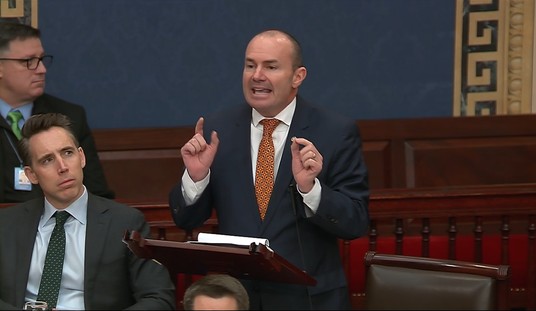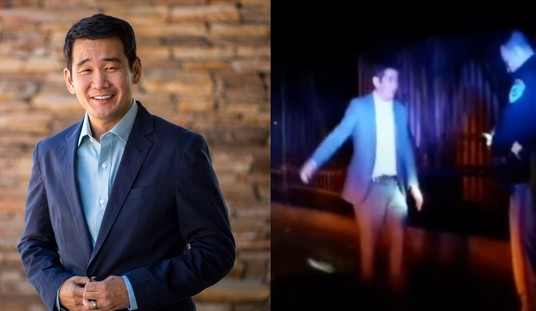
FILE – In this April 25, 2018, file photo, Attorney General Jeff Sessions speaks on Capitol Hill in Washington. The Trump administration said in a court filing late Thursday that it will no longer defend key parts of the Affordable Care Act, including the requirement that people have health insurance and provisions that guarantee access to health insurance regardless of any medical conditions. Sessions said in a letter to Congress on June 7, that President Donald Trump, who campaigned on repealing the law and nearly did so his first year in office, approved the legal strategy. (AP Photo/Andrew Harnik, File)
Earlier in the year, Attorney General Jeff Sessions announced that he was taking personal control of the immigration court system. Immigration judges and the entire appeals system is an Article 2 function. That means the cases are tried and adjudicated within the executive branch. The Attorney General has the statutory authority to make the final decision on any and all immigration cases but, in the past, has always delegated that authority. One of the immediate interests expressed by Sessions was in the asylum process and the ability of persons to use domestic violence as a reason to gain political asylum in the United States. In question was this decision:
On Christmas Day of 2005, Aminta Cifuentes illegally crossed into the United States to seek asylum. Cifuentes, a Guatemalan citizen, had fled her abusive husband, who beat her weekly, raped her, and once poured turpentine on her skin in an attempt to set her on fire. Cifuentes had called the police on her husband several times, but the officers told her they wouldn’t interfere in a marital relationship. Her husband then threatened to kill her if she continued to call the police, or if she left him. She fled to America to save her life.
At first, an immigration judge denied Cifuentes’ asylum application. He reasoned that she had suffered from “criminal acts, not persecution,” and was thus eligible for deportation. In 2014, however, the Board of Immigration Appeals reversed the judge in a landmark decision that allowed victims of domestic violence to apply for asylum on the basis of their abuse.
…Under federal statute, asylum applicants may receive relief only if they can show they were persecuted because of at least one of five traits: race, religion, nationality, political opinion, or “membership in a particular social group.” That last category has proved difficult to define, but under current board precedent, an individual qualifies if she can prove her “social group” shares a “common immutable characteristic” that can be “defined with particularity” and is “socially distinct within the society in question.” So, for instance, gay and transgender people fleeing persecution may belong to a “particular social group” that qualifies them for asylum.
With a stroke of a pen, the Board of Immigration Appeals established a whole new class of eligibility for political asylum. A right that had belonged to a persecuted class had been deftly given to anyone who could make a colorable claim of domestic violence at home.
It was speculated that Sessions taking on this case would result in its reversal.
A little earlier today, Sessions was speaking to a group of immigration judges at the Executive Office for Immigration Review Legal Training Program. This is part of what he had to say:
As you all well know, one of our major difficulties today is the asylum process.
The asylum system is being abused to the detriment of the rule of law, sound public policy, and public safety— and to the detriment of people with just claims. Saying a few simple words—claiming a fear of return—is now transforming a straightforward arrest for illegal entry and immediate return into a prolonged legal process, where an alien may be released from custody into the United States and possibly never show up for an immigration hearing. This is a large part of what has been accurately called, “catch and release”.
Beginning in 2009, more and more aliens who passed an initial USCIS credible fear review were released from custody into the United States pending a full hearing. Powerful incentives were created for aliens to come here illegally and claim a fear of return. In effect, word spread that by asserting this fear, they could remain in the United States one way or the other. Far too often, that rumor proved to be true.
The results are just what one would expect. The number of illegal entrants has surged. Credible fear claims have skyrocketed, and the percentage of asylum claims found meritorious by our judges declined.
That’s because the vast majority of the current asylum claims are not valid. For the last five years, only 20 percent of claims have been found to be meritorious after a hearing before an Immigration Judge. In addition, some fifteen percent are found invalid by USCIS as a part of their initial screening.
Further illustrating this point, in 2009, DHS conducted more than 5,000 credible fear reviews. By 2016, only seven years later, that number had increased to 94,000. The number of these aliens placed in immigration court proceedings went from fewer than 4,000 to more than 73,000 by 2016—nearly a 19-fold increase—overwhelming the system and leaving legitimate claims buried.
Now we all know that many of those crossing our border illegally are leaving difficult and dangerous situations. And we understand all are due proper respect and the proper legal process. But we cannot abandon legal discipline and sound legal concepts.
Under the INA, asylum is available for those who leave their home country because of persecution or fear on account of race, religion, nationality, or membership in a particular social group or political opinion. Asylum was never meant to alleviate all problems— even all serious problems— that people face every day all over the world.
Today, exercising the responsibility given to me under the INA, I will be issuing a decision that restores sound principles of asylum and long standing principles of immigration law.
We have not acted hastily, but carefully. In my judgment, this is a correct interpretation of the law. It advances the original intent and purpose of the INA, and it will be your duty to carry out this ruling.
This decision will provide more clarity for you. It will help you to rule consistently and fairly.
Now Sessions has officially forbidden the use of domestic violence as a means of obtaining asylum.
(1) Matter of A-R-C-G-, 26 I&N Dec. 338 (BIA 2014) is overruled. That decision was wrongly decided and should not have been issued as a precedential decision.
(2) An applicant seeking to establish persecution on account of membership in a “particular social group” must demonstrate: (1) membership in a group, which is composed of members who share a common immutable characteristic, is defined with particularity, and is socially distinct within the society in question; and (2) that membership in the group is a central reason for her persecution. When the alleged persecutor is someone unaffiliated with the government, the applicant must also show that her home government is unwilling or unable to protect her.
(3) An asylum applicant has the burden of showing her eligibility for asylum. The applicant must present facts that establish each element of the standard, and the asylum officer, immigration judge, or the Board has the duty to determine whether those facts satisfy all of those elements.
(4 )If an asylum application is fatally flawed in one respect, an immigration judge or the Board need not examine the remaining elements of the asylum claim.
(5) The mere fact that a country may have problems effectively policing certain crimes or that certain populations are more likely to be victims of crime, cannot itself establish an asylum claim.
(6) To be cognizable, a particular social group must exist independently of the harm asserted in an application for asylum.
(7) An applicant seeking to establish persecution based on violent conduct of a private actor must show more than the government’s difficulty controlling private behavior. The applicant must show that the government condoned the private actions or demonstrated an inability to protect the victims.
(8) An applicant seeking asylum based on membership in a particular social group must clearly indicate on the record the exact delineation of any proposed particular social group.
(9) The Board, immigration judges, and all asylum officers must consider, consistent with the regulations, whether internal relocation in the alien’s home country presents a reasonable alternative before granting asylum.
…
Generally, claims by aliens pertaining to domestic violence or gang violence perpetrated by non-governmental actors will not qualify for asylum. While I do not decide that violence inflicted by non-governmental actors may never serve as the basis for an asylum or withholding application based on membership in a particular social group, in practice such claims are unlikely to satisfy the statutory grounds for proving group persecution that the government is unable or unwilling to address. The mere fact that a country may have problems effectively policing certain crimes—such as domestic violence or gang violence—or that certain populations are more likely to be victims of crime, cannot itself establish an asylum claim.
https://twitter.com/elisefoley/status/1006261423532662785
BREAKING: Attorney General Jeff Sessions just singlehandedly barred victims of domestic violence from applying for asylum in the U.S. Today's decision will condemn thousands of abuse victims to certain brutality and death.
Read more about the case here: https://t.co/zwQVPanWrG
— Mark Joseph Stern (@mjs_DC) June 11, 2018
Jeff Sessions has ordered immigration judges to stop granting asylum to most victims of domestic abuse and gang violence, a move that would block tens of thousands of people, especially women, from seeking refuge in America. https://t.co/QPw4BOJH9K
— Kyle Griffin (@kylegriffin1) June 11, 2018
How bad is this? It's really bad.
"Untold numbers of victims of violence, including women abused by their partners, could be denied asylum and deported back to danger at home because of a new ruling Attorney General Jeff Sessions issued Monday."
— Jennifer Bendery (@jbendery) June 11, 2018
Sessions is awful https://t.co/j2tLLh5sAv
— Seth Mandel (@SethAMandel) June 11, 2018
The Jeff Sessions move to crack down on asylum-seekers comes after Trump has publicly and repeatedly torched U.S. asylum laws as too lenient, particularly in giving new arrivals the right to make their case.https://t.co/vfqOx2yz83
— Sahil Kapur (@sahilkapur) June 11, 2018
It took decades, but when the US started offering asylum to women fleeing domestic violence, it saved literally thousands of lives: https://t.co/Qtxx9tVzuy
This is the work Jeff Sessions just undid in one fell swoop https://t.co/GGHPL8DxuP
— Molly Redden (@mtredden) June 11, 2018
https://twitter.com/elisefoley/status/1006263188055318529
This is, in my view, a very good and very overdue thing. Asylum was created to provide safe harbor for persons fleeing genocide or ethnic cleansing. It was not created to accommodate people because of a break down of law and order, because of gang violence, or because of unprovable allegations of domestic abuse. If Congress wants to amend the law, it is certainly able to do so. What can’t be allowed is for the law to be stretched beyond recognition by administrative fiat. Every time that happens, nothing good comes from it and it causes more problems.














Join the conversation as a VIP Member